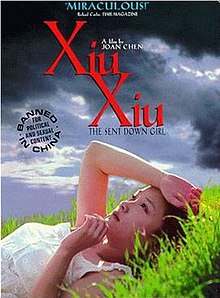Xiu Xiu: The Sent Down Girl: Difference between revisions
No edit summary |
|||
| Line 4: | Line 4: | ||
| caption = |
| caption = |
||
| writer = [[Geling Yan]]<br>(novel)<br>[[Joan Chen]]<br>(screenplay) |
| writer = [[Geling Yan]]<br>(novel)<br>[[Joan Chen]]<br>(screenplay) |
||
| starring = [[Li Xiaolu]]<br> |
| starring = [[Li Xiaolu]]<br>Lopsang<br>Zheng Qian |
||
| director = [[Joan Chen]] |
| director = [[Joan Chen]] |
||
| producer = |
| producer = Alice Chen<br>[[Joan Chen]] |
||
| distributor = [[Good Machine]] |
| distributor = [[Good Machine]] |
||
| released = February 1998 (Berlin Film Festival) |
| released = February 1998 (Berlin Film Festival) |
||
| Line 12: | Line 12: | ||
| country = China |
| country = China |
||
| language = [[Mandarin Chinese|Mandarin]] |
| language = [[Mandarin Chinese|Mandarin]] |
||
| music = |
| music = Johnny Chen |
||
| awards = [http://www.imdb.com/title/tt0115005/awards See IMDb] |
| awards = [http://www.imdb.com/title/tt0115005/awards See IMDb] |
||
| budget = |
| budget = |
||
Revision as of 17:36, 26 November 2014
| Xiu Xiu: The Sent Down Girl | |
|---|---|
 | |
| Directed by | Joan Chen |
| Written by | Geling Yan (novel) Joan Chen (screenplay) |
| Produced by | Alice Chen Joan Chen |
| Starring | Li Xiaolu Lopsang Zheng Qian |
| Music by | Johnny Chen |
| Distributed by | Good Machine |
Release date | February 1998 (Berlin Film Festival) |
Running time | 99 minutes (theatrical) |
| Country | China |
| Language | Mandarin |
Xiu Xiu: The Sent Down Girl (Chinese: 天浴; pinyin: Tiān Yù) is a 1998 Chinese film directed by actress Joan Chen based during the 1970s in People's Republic of China, during the Cultural Revolution's Down to the Countryside Movement. This drama film is the directorial debut of Chen.[1] The film stars Li Xiaolu (Chinese: 李小璐) and Lopsang (Chinese: 洛桑群培).
Plot
Xiu Xiu (Chinese: 秀秀), a 15-year-old girl living in the city of Chengdu, moves out to study horses in the countryside with a nomadic Tibetan. She is told that after six months, she will return to take charge of her all-girl cavalry unit. However she quickly discovers that she is not returning. She learns lessons about life while struggling against corrupt government officials who manipulate her hopes and body. Her only friend is the eunuch horseman, Lao Jin.
Reception
Distribution
Although the U.S. distributor claimed the film was banned in China for sexual and political content, the script was actually approved by the Chinese government. The film was only banned after the filmmakers decided not to wait for permits before shooting in Tibet (such permits are required for a film to receive official approval).[2]
Awards and nominations
- 1998: won for Best Director (Joan Chen)
- 1998: won for Best Screenplay Adapted from Another Medium (Joan Chen)
- 1998: won for Best Actress (Li Xiaolu)
- 1998: won for Best Actor (LupSang)
- 1998: nominated for the Golden Bear[3]
- 1998: won the Jury Award
- 1999: won the Special Jury Prize
- 1999: nominated for the Grand Prize
- 1999: won Best Actress (Li Xiaolu)
- 1999: won the Grand Prize
- 1999: won the International Freedom Award
- 2000: nominated for Best First Feature Over $500,000 (John Chen, shared with co-producer Alice Chan Wai-Chung)
References
- ^ "Wettbewerb/In Competition". Moving Pictures, Berlinale Extra. Berlin: 37. 11–22 February 1998.
{{cite journal}}: Cite has empty unknown parameter:|coauthors=(help) - ^ Tian yu on IMDb
- ^ "Berlinale: 1998 Programme". berlinale.de. Retrieved 2012-01-23.
External links
- Xiu Xiu: The Sent Down Girl at IMDb
- Template:Amg movie
- Xiu Xiu: The Sent Down Girl at Rotten Tomatoes
- Xiu Xiu: The Sent Down Girl at Yahoo! Movies
- Xiu Xiu: The Sent Down Girl at Popmatters review
- Xiu Xiu: The Sent Down Girl at Box Office Mojo
